Leadership and Management in Unilever: A Comprehensive Report
VerifiedAdded on 2023/01/09
|13
|4416
|48
Report
AI Summary
This report provides a comprehensive overview of leadership and management principles, focusing on their application within the context of Unilever. It begins by defining leadership and management, exploring key concepts such as influencing behavior and interpersonal processes. The report then evaluates significant management and leadership theories, including The Great Man Theory and Human Relations theory, assessing their impact on organizational practices. A critical assessment of the challenges in leadership and management is provided. The report then analyzes key motivational theories, such as Maslow's Hierarchy of Needs and Herzberg's Motivation-Hygiene theory, and their influence on organizational success. Performance management techniques, including 360-degree feedback and training programs, are examined. Finally, the report evaluates the role of leadership and management in employee motivation and team development, offering insights into effective strategies for enhancing organizational productivity and employee satisfaction. The report concludes with a summary of the findings and their implications for leadership and management practice.
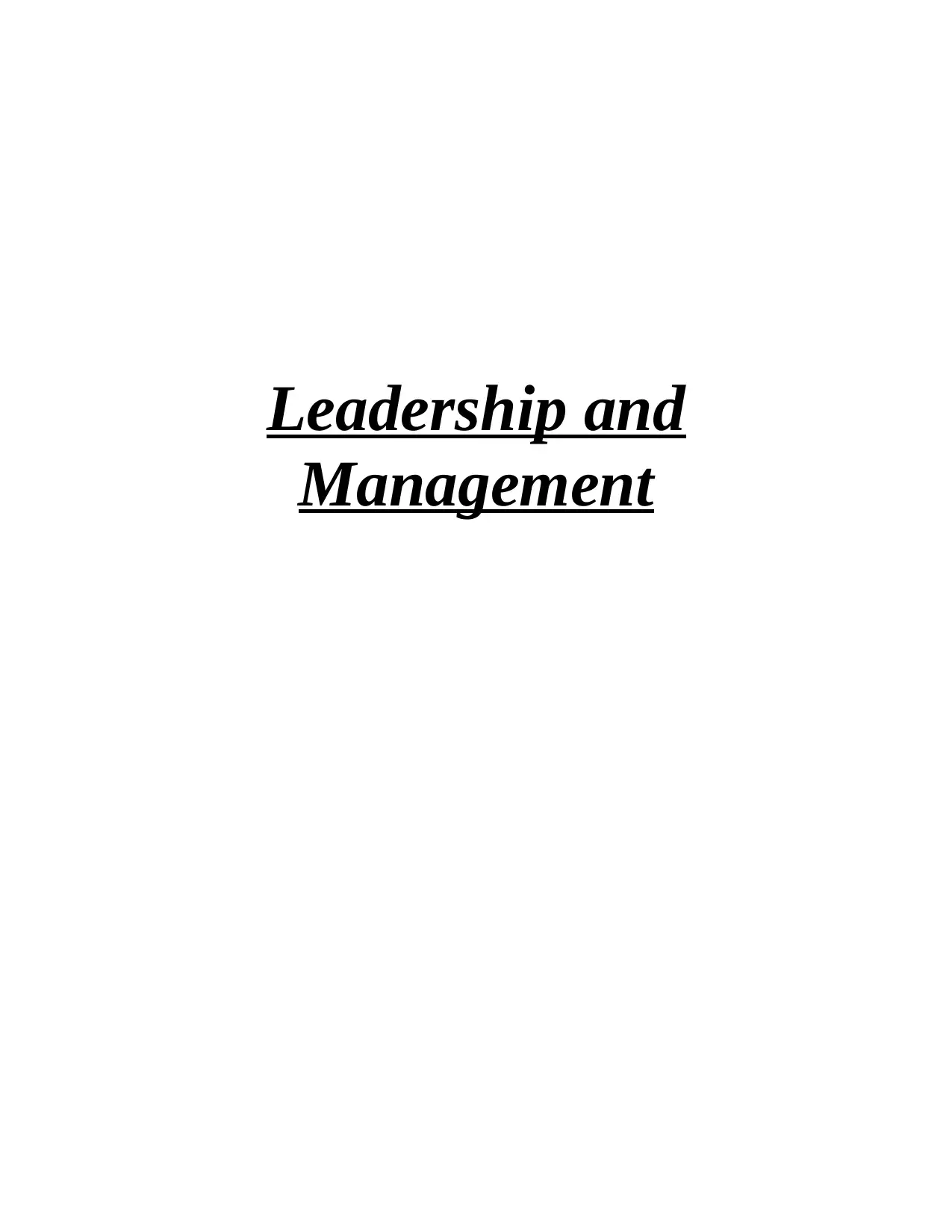
Leadership and
Management
Management
Paraphrase This Document
Need a fresh take? Get an instant paraphrase of this document with our AI Paraphraser
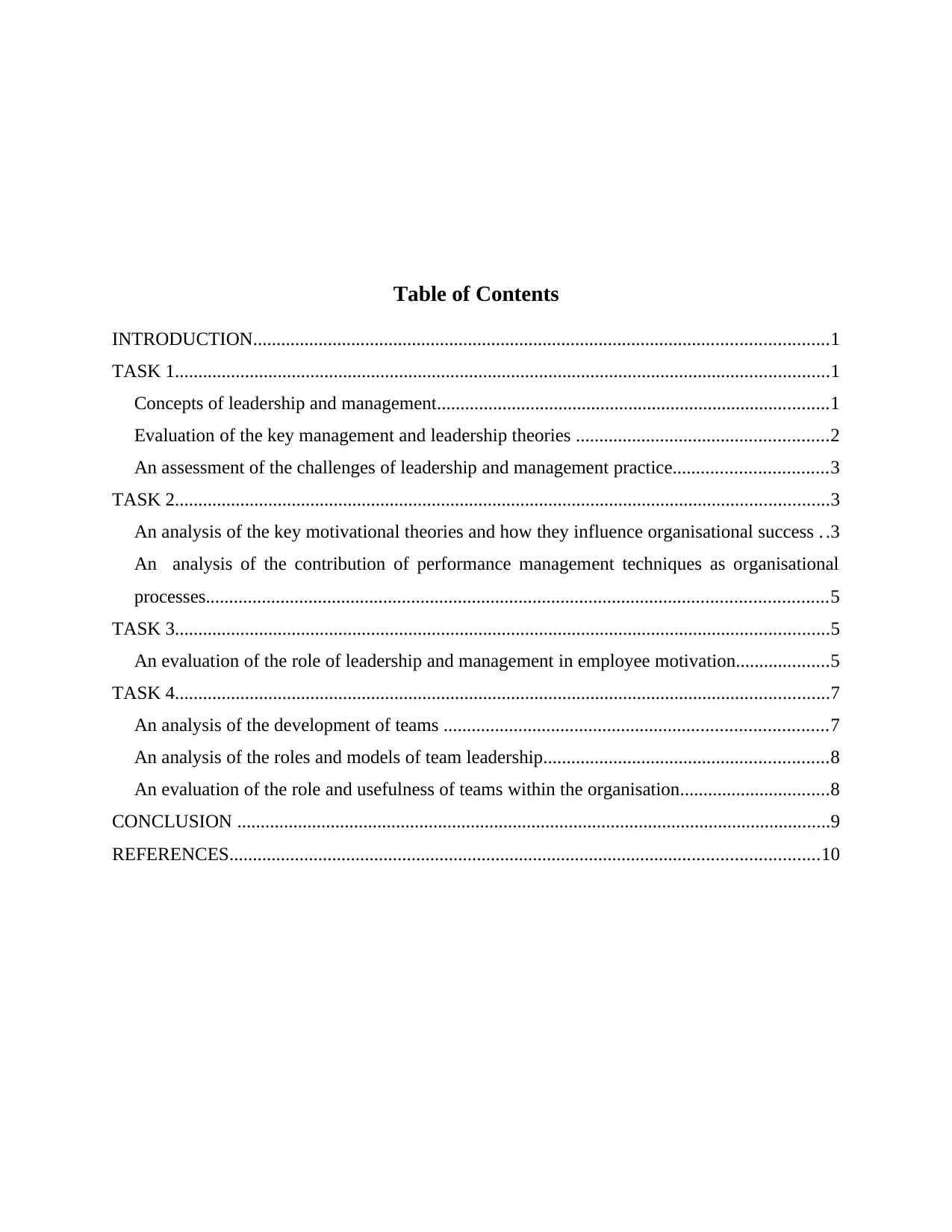
Table of Contents
INTRODUCTION...........................................................................................................................1
TASK 1............................................................................................................................................1
Concepts of leadership and management....................................................................................1
Evaluation of the key management and leadership theories ......................................................2
An assessment of the challenges of leadership and management practice.................................3
TASK 2............................................................................................................................................3
An analysis of the key motivational theories and how they influence organisational success . .3
An analysis of the contribution of performance management techniques as organisational
processes.....................................................................................................................................5
TASK 3............................................................................................................................................5
An evaluation of the role of leadership and management in employee motivation....................5
TASK 4............................................................................................................................................7
An analysis of the development of teams ..................................................................................7
An analysis of the roles and models of team leadership.............................................................8
An evaluation of the role and usefulness of teams within the organisation................................8
CONCLUSION ...............................................................................................................................9
REFERENCES..............................................................................................................................10
INTRODUCTION...........................................................................................................................1
TASK 1............................................................................................................................................1
Concepts of leadership and management....................................................................................1
Evaluation of the key management and leadership theories ......................................................2
An assessment of the challenges of leadership and management practice.................................3
TASK 2............................................................................................................................................3
An analysis of the key motivational theories and how they influence organisational success . .3
An analysis of the contribution of performance management techniques as organisational
processes.....................................................................................................................................5
TASK 3............................................................................................................................................5
An evaluation of the role of leadership and management in employee motivation....................5
TASK 4............................................................................................................................................7
An analysis of the development of teams ..................................................................................7
An analysis of the roles and models of team leadership.............................................................8
An evaluation of the role and usefulness of teams within the organisation................................8
CONCLUSION ...............................................................................................................................9
REFERENCES..............................................................................................................................10
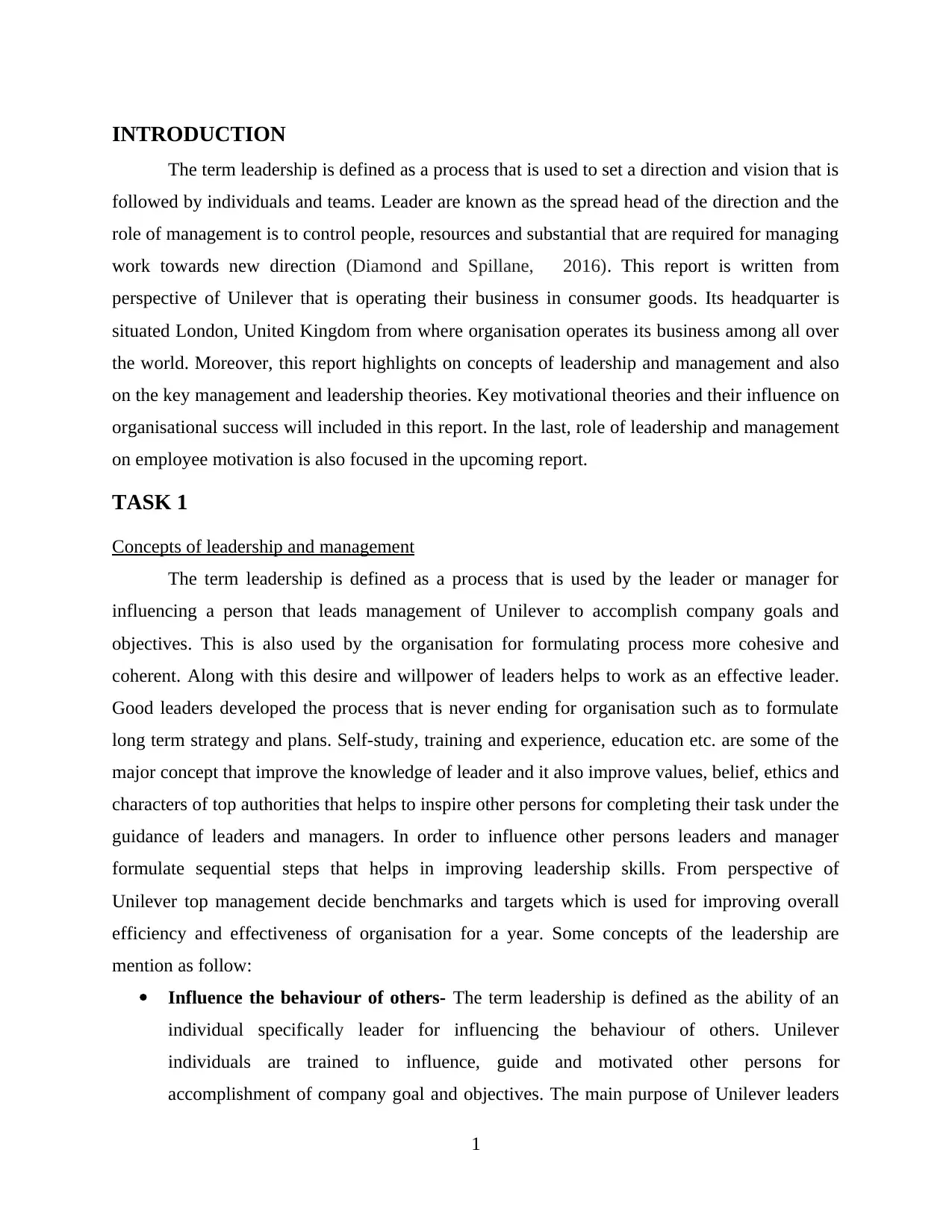
INTRODUCTION
The term leadership is defined as a process that is used to set a direction and vision that is
followed by individuals and teams. Leader are known as the spread head of the direction and the
role of management is to control people, resources and substantial that are required for managing
work towards new direction (Diamond and Spillane, 2016). This report is written from
perspective of Unilever that is operating their business in consumer goods. Its headquarter is
situated London, United Kingdom from where organisation operates its business among all over
the world. Moreover, this report highlights on concepts of leadership and management and also
on the key management and leadership theories. Key motivational theories and their influence on
organisational success will included in this report. In the last, role of leadership and management
on employee motivation is also focused in the upcoming report.
TASK 1
Concepts of leadership and management
The term leadership is defined as a process that is used by the leader or manager for
influencing a person that leads management of Unilever to accomplish company goals and
objectives. This is also used by the organisation for formulating process more cohesive and
coherent. Along with this desire and willpower of leaders helps to work as an effective leader.
Good leaders developed the process that is never ending for organisation such as to formulate
long term strategy and plans. Self-study, training and experience, education etc. are some of the
major concept that improve the knowledge of leader and it also improve values, belief, ethics and
characters of top authorities that helps to inspire other persons for completing their task under the
guidance of leaders and managers. In order to influence other persons leaders and manager
formulate sequential steps that helps in improving leadership skills. From perspective of
Unilever top management decide benchmarks and targets which is used for improving overall
efficiency and effectiveness of organisation for a year. Some concepts of the leadership are
mention as follow:
Influence the behaviour of others- The term leadership is defined as the ability of an
individual specifically leader for influencing the behaviour of others. Unilever
individuals are trained to influence, guide and motivated other persons for
accomplishment of company goal and objectives. The main purpose of Unilever leaders
1
The term leadership is defined as a process that is used to set a direction and vision that is
followed by individuals and teams. Leader are known as the spread head of the direction and the
role of management is to control people, resources and substantial that are required for managing
work towards new direction (Diamond and Spillane, 2016). This report is written from
perspective of Unilever that is operating their business in consumer goods. Its headquarter is
situated London, United Kingdom from where organisation operates its business among all over
the world. Moreover, this report highlights on concepts of leadership and management and also
on the key management and leadership theories. Key motivational theories and their influence on
organisational success will included in this report. In the last, role of leadership and management
on employee motivation is also focused in the upcoming report.
TASK 1
Concepts of leadership and management
The term leadership is defined as a process that is used by the leader or manager for
influencing a person that leads management of Unilever to accomplish company goals and
objectives. This is also used by the organisation for formulating process more cohesive and
coherent. Along with this desire and willpower of leaders helps to work as an effective leader.
Good leaders developed the process that is never ending for organisation such as to formulate
long term strategy and plans. Self-study, training and experience, education etc. are some of the
major concept that improve the knowledge of leader and it also improve values, belief, ethics and
characters of top authorities that helps to inspire other persons for completing their task under the
guidance of leaders and managers. In order to influence other persons leaders and manager
formulate sequential steps that helps in improving leadership skills. From perspective of
Unilever top management decide benchmarks and targets which is used for improving overall
efficiency and effectiveness of organisation for a year. Some concepts of the leadership are
mention as follow:
Influence the behaviour of others- The term leadership is defined as the ability of an
individual specifically leader for influencing the behaviour of others. Unilever
individuals are trained to influence, guide and motivated other persons for
accomplishment of company goal and objectives. The main purpose of Unilever leaders
1
⊘ This is a preview!⊘
Do you want full access?
Subscribe today to unlock all pages.

Trusted by 1+ million students worldwide
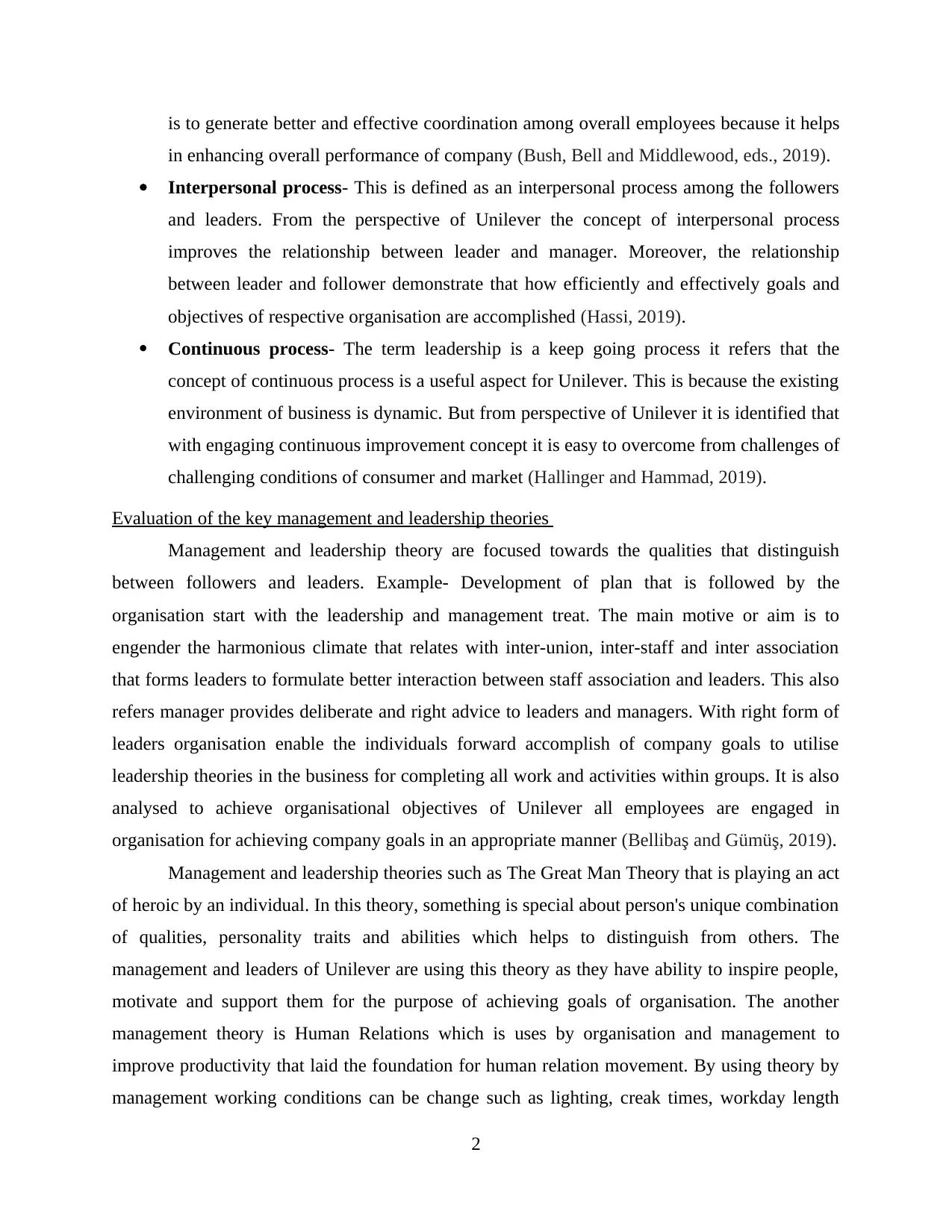
is to generate better and effective coordination among overall employees because it helps
in enhancing overall performance of company (Bush, Bell and Middlewood, eds., 2019).
Interpersonal process- This is defined as an interpersonal process among the followers
and leaders. From the perspective of Unilever the concept of interpersonal process
improves the relationship between leader and manager. Moreover, the relationship
between leader and follower demonstrate that how efficiently and effectively goals and
objectives of respective organisation are accomplished (Hassi, 2019).
Continuous process- The term leadership is a keep going process it refers that the
concept of continuous process is a useful aspect for Unilever. This is because the existing
environment of business is dynamic. But from perspective of Unilever it is identified that
with engaging continuous improvement concept it is easy to overcome from challenges of
challenging conditions of consumer and market (Hallinger and Hammad, 2019).
Evaluation of the key management and leadership theories
Management and leadership theory are focused towards the qualities that distinguish
between followers and leaders. Example- Development of plan that is followed by the
organisation start with the leadership and management treat. The main motive or aim is to
engender the harmonious climate that relates with inter-union, inter-staff and inter association
that forms leaders to formulate better interaction between staff association and leaders. This also
refers manager provides deliberate and right advice to leaders and managers. With right form of
leaders organisation enable the individuals forward accomplish of company goals to utilise
leadership theories in the business for completing all work and activities within groups. It is also
analysed to achieve organisational objectives of Unilever all employees are engaged in
organisation for achieving company goals in an appropriate manner (Bellibaş and Gümüş, 2019).
Management and leadership theories such as The Great Man Theory that is playing an act
of heroic by an individual. In this theory, something is special about person's unique combination
of qualities, personality traits and abilities which helps to distinguish from others. The
management and leaders of Unilever are using this theory as they have ability to inspire people,
motivate and support them for the purpose of achieving goals of organisation. The another
management theory is Human Relations which is uses by organisation and management to
improve productivity that laid the foundation for human relation movement. By using theory by
management working conditions can be change such as lighting, creak times, workday length
2
in enhancing overall performance of company (Bush, Bell and Middlewood, eds., 2019).
Interpersonal process- This is defined as an interpersonal process among the followers
and leaders. From the perspective of Unilever the concept of interpersonal process
improves the relationship between leader and manager. Moreover, the relationship
between leader and follower demonstrate that how efficiently and effectively goals and
objectives of respective organisation are accomplished (Hassi, 2019).
Continuous process- The term leadership is a keep going process it refers that the
concept of continuous process is a useful aspect for Unilever. This is because the existing
environment of business is dynamic. But from perspective of Unilever it is identified that
with engaging continuous improvement concept it is easy to overcome from challenges of
challenging conditions of consumer and market (Hallinger and Hammad, 2019).
Evaluation of the key management and leadership theories
Management and leadership theory are focused towards the qualities that distinguish
between followers and leaders. Example- Development of plan that is followed by the
organisation start with the leadership and management treat. The main motive or aim is to
engender the harmonious climate that relates with inter-union, inter-staff and inter association
that forms leaders to formulate better interaction between staff association and leaders. This also
refers manager provides deliberate and right advice to leaders and managers. With right form of
leaders organisation enable the individuals forward accomplish of company goals to utilise
leadership theories in the business for completing all work and activities within groups. It is also
analysed to achieve organisational objectives of Unilever all employees are engaged in
organisation for achieving company goals in an appropriate manner (Bellibaş and Gümüş, 2019).
Management and leadership theories such as The Great Man Theory that is playing an act
of heroic by an individual. In this theory, something is special about person's unique combination
of qualities, personality traits and abilities which helps to distinguish from others. The
management and leaders of Unilever are using this theory as they have ability to inspire people,
motivate and support them for the purpose of achieving goals of organisation. The another
management theory is Human Relations which is uses by organisation and management to
improve productivity that laid the foundation for human relation movement. By using theory by
management working conditions can be change such as lighting, creak times, workday length
2
Paraphrase This Document
Need a fresh take? Get an instant paraphrase of this document with our AI Paraphraser
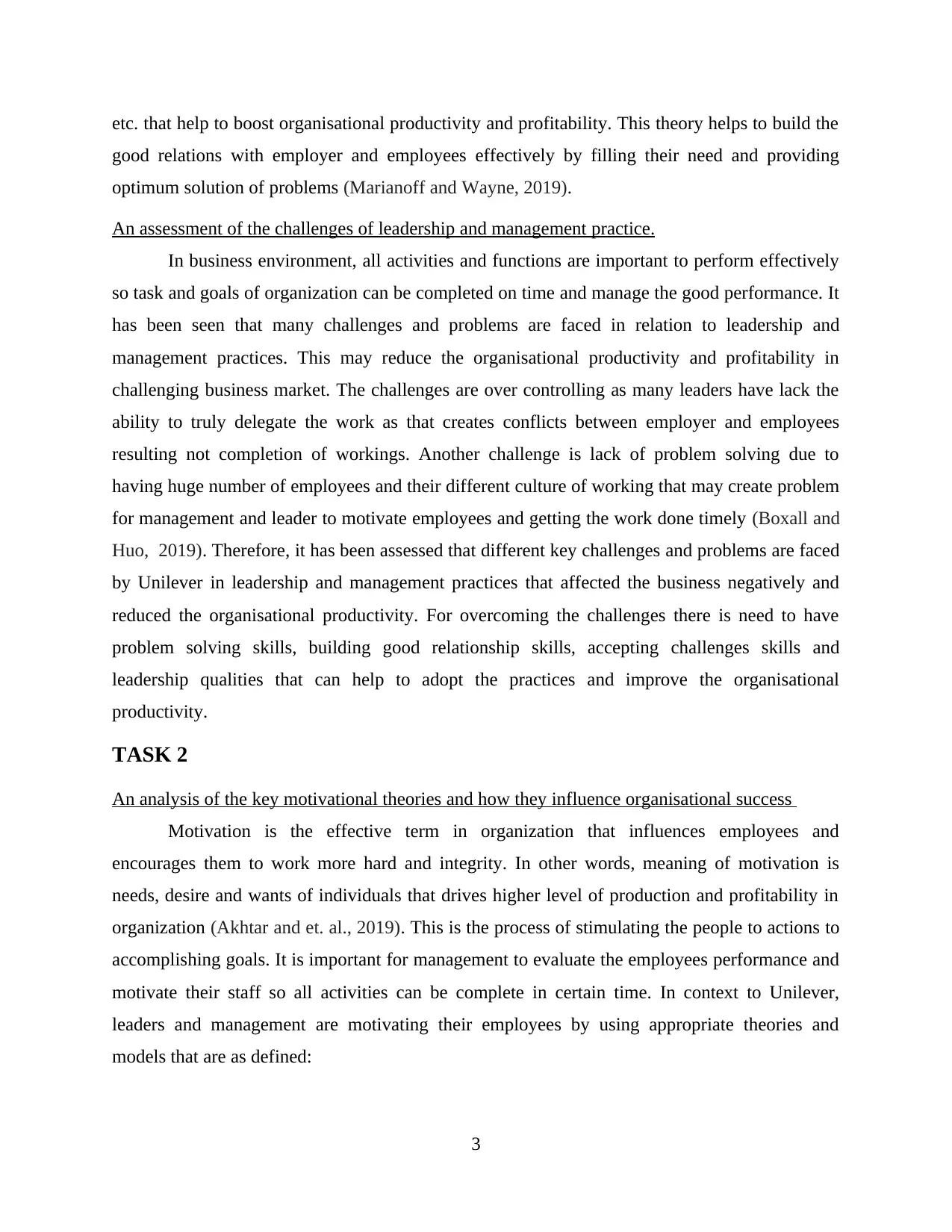
etc. that help to boost organisational productivity and profitability. This theory helps to build the
good relations with employer and employees effectively by filling their need and providing
optimum solution of problems (Marianoff and Wayne, 2019).
An assessment of the challenges of leadership and management practice.
In business environment, all activities and functions are important to perform effectively
so task and goals of organization can be completed on time and manage the good performance. It
has been seen that many challenges and problems are faced in relation to leadership and
management practices. This may reduce the organisational productivity and profitability in
challenging business market. The challenges are over controlling as many leaders have lack the
ability to truly delegate the work as that creates conflicts between employer and employees
resulting not completion of workings. Another challenge is lack of problem solving due to
having huge number of employees and their different culture of working that may create problem
for management and leader to motivate employees and getting the work done timely (Boxall and
Huo, 2019). Therefore, it has been assessed that different key challenges and problems are faced
by Unilever in leadership and management practices that affected the business negatively and
reduced the organisational productivity. For overcoming the challenges there is need to have
problem solving skills, building good relationship skills, accepting challenges skills and
leadership qualities that can help to adopt the practices and improve the organisational
productivity.
TASK 2
An analysis of the key motivational theories and how they influence organisational success
Motivation is the effective term in organization that influences employees and
encourages them to work more hard and integrity. In other words, meaning of motivation is
needs, desire and wants of individuals that drives higher level of production and profitability in
organization (Akhtar and et. al., 2019). This is the process of stimulating the people to actions to
accomplishing goals. It is important for management to evaluate the employees performance and
motivate their staff so all activities can be complete in certain time. In context to Unilever,
leaders and management are motivating their employees by using appropriate theories and
models that are as defined:
3
good relations with employer and employees effectively by filling their need and providing
optimum solution of problems (Marianoff and Wayne, 2019).
An assessment of the challenges of leadership and management practice.
In business environment, all activities and functions are important to perform effectively
so task and goals of organization can be completed on time and manage the good performance. It
has been seen that many challenges and problems are faced in relation to leadership and
management practices. This may reduce the organisational productivity and profitability in
challenging business market. The challenges are over controlling as many leaders have lack the
ability to truly delegate the work as that creates conflicts between employer and employees
resulting not completion of workings. Another challenge is lack of problem solving due to
having huge number of employees and their different culture of working that may create problem
for management and leader to motivate employees and getting the work done timely (Boxall and
Huo, 2019). Therefore, it has been assessed that different key challenges and problems are faced
by Unilever in leadership and management practices that affected the business negatively and
reduced the organisational productivity. For overcoming the challenges there is need to have
problem solving skills, building good relationship skills, accepting challenges skills and
leadership qualities that can help to adopt the practices and improve the organisational
productivity.
TASK 2
An analysis of the key motivational theories and how they influence organisational success
Motivation is the effective term in organization that influences employees and
encourages them to work more hard and integrity. In other words, meaning of motivation is
needs, desire and wants of individuals that drives higher level of production and profitability in
organization (Akhtar and et. al., 2019). This is the process of stimulating the people to actions to
accomplishing goals. It is important for management to evaluate the employees performance and
motivate their staff so all activities can be complete in certain time. In context to Unilever,
leaders and management are motivating their employees by using appropriate theories and
models that are as defined:
3
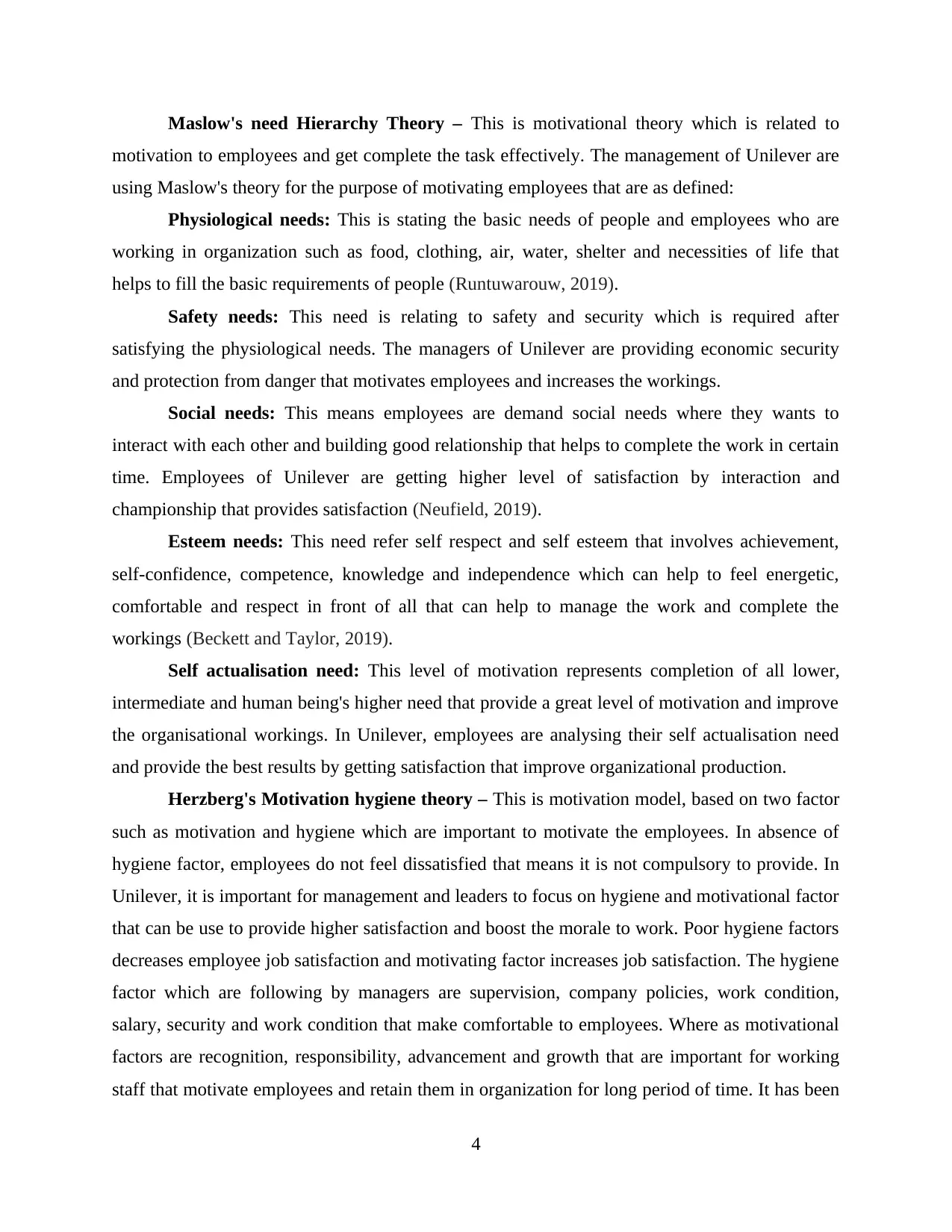
Maslow's need Hierarchy Theory – This is motivational theory which is related to
motivation to employees and get complete the task effectively. The management of Unilever are
using Maslow's theory for the purpose of motivating employees that are as defined:
Physiological needs: This is stating the basic needs of people and employees who are
working in organization such as food, clothing, air, water, shelter and necessities of life that
helps to fill the basic requirements of people (Runtuwarouw, 2019).
Safety needs: This need is relating to safety and security which is required after
satisfying the physiological needs. The managers of Unilever are providing economic security
and protection from danger that motivates employees and increases the workings.
Social needs: This means employees are demand social needs where they wants to
interact with each other and building good relationship that helps to complete the work in certain
time. Employees of Unilever are getting higher level of satisfaction by interaction and
championship that provides satisfaction (Neufield, 2019).
Esteem needs: This need refer self respect and self esteem that involves achievement,
self-confidence, competence, knowledge and independence which can help to feel energetic,
comfortable and respect in front of all that can help to manage the work and complete the
workings (Beckett and Taylor, 2019).
Self actualisation need: This level of motivation represents completion of all lower,
intermediate and human being's higher need that provide a great level of motivation and improve
the organisational workings. In Unilever, employees are analysing their self actualisation need
and provide the best results by getting satisfaction that improve organizational production.
Herzberg's Motivation hygiene theory – This is motivation model, based on two factor
such as motivation and hygiene which are important to motivate the employees. In absence of
hygiene factor, employees do not feel dissatisfied that means it is not compulsory to provide. In
Unilever, it is important for management and leaders to focus on hygiene and motivational factor
that can be use to provide higher satisfaction and boost the morale to work. Poor hygiene factors
decreases employee job satisfaction and motivating factor increases job satisfaction. The hygiene
factor which are following by managers are supervision, company policies, work condition,
salary, security and work condition that make comfortable to employees. Where as motivational
factors are recognition, responsibility, advancement and growth that are important for working
staff that motivate employees and retain them in organization for long period of time. It has been
4
motivation to employees and get complete the task effectively. The management of Unilever are
using Maslow's theory for the purpose of motivating employees that are as defined:
Physiological needs: This is stating the basic needs of people and employees who are
working in organization such as food, clothing, air, water, shelter and necessities of life that
helps to fill the basic requirements of people (Runtuwarouw, 2019).
Safety needs: This need is relating to safety and security which is required after
satisfying the physiological needs. The managers of Unilever are providing economic security
and protection from danger that motivates employees and increases the workings.
Social needs: This means employees are demand social needs where they wants to
interact with each other and building good relationship that helps to complete the work in certain
time. Employees of Unilever are getting higher level of satisfaction by interaction and
championship that provides satisfaction (Neufield, 2019).
Esteem needs: This need refer self respect and self esteem that involves achievement,
self-confidence, competence, knowledge and independence which can help to feel energetic,
comfortable and respect in front of all that can help to manage the work and complete the
workings (Beckett and Taylor, 2019).
Self actualisation need: This level of motivation represents completion of all lower,
intermediate and human being's higher need that provide a great level of motivation and improve
the organisational workings. In Unilever, employees are analysing their self actualisation need
and provide the best results by getting satisfaction that improve organizational production.
Herzberg's Motivation hygiene theory – This is motivation model, based on two factor
such as motivation and hygiene which are important to motivate the employees. In absence of
hygiene factor, employees do not feel dissatisfied that means it is not compulsory to provide. In
Unilever, it is important for management and leaders to focus on hygiene and motivational factor
that can be use to provide higher satisfaction and boost the morale to work. Poor hygiene factors
decreases employee job satisfaction and motivating factor increases job satisfaction. The hygiene
factor which are following by managers are supervision, company policies, work condition,
salary, security and work condition that make comfortable to employees. Where as motivational
factors are recognition, responsibility, advancement and growth that are important for working
staff that motivate employees and retain them in organization for long period of time. It has been
4
⊘ This is a preview!⊘
Do you want full access?
Subscribe today to unlock all pages.

Trusted by 1+ million students worldwide
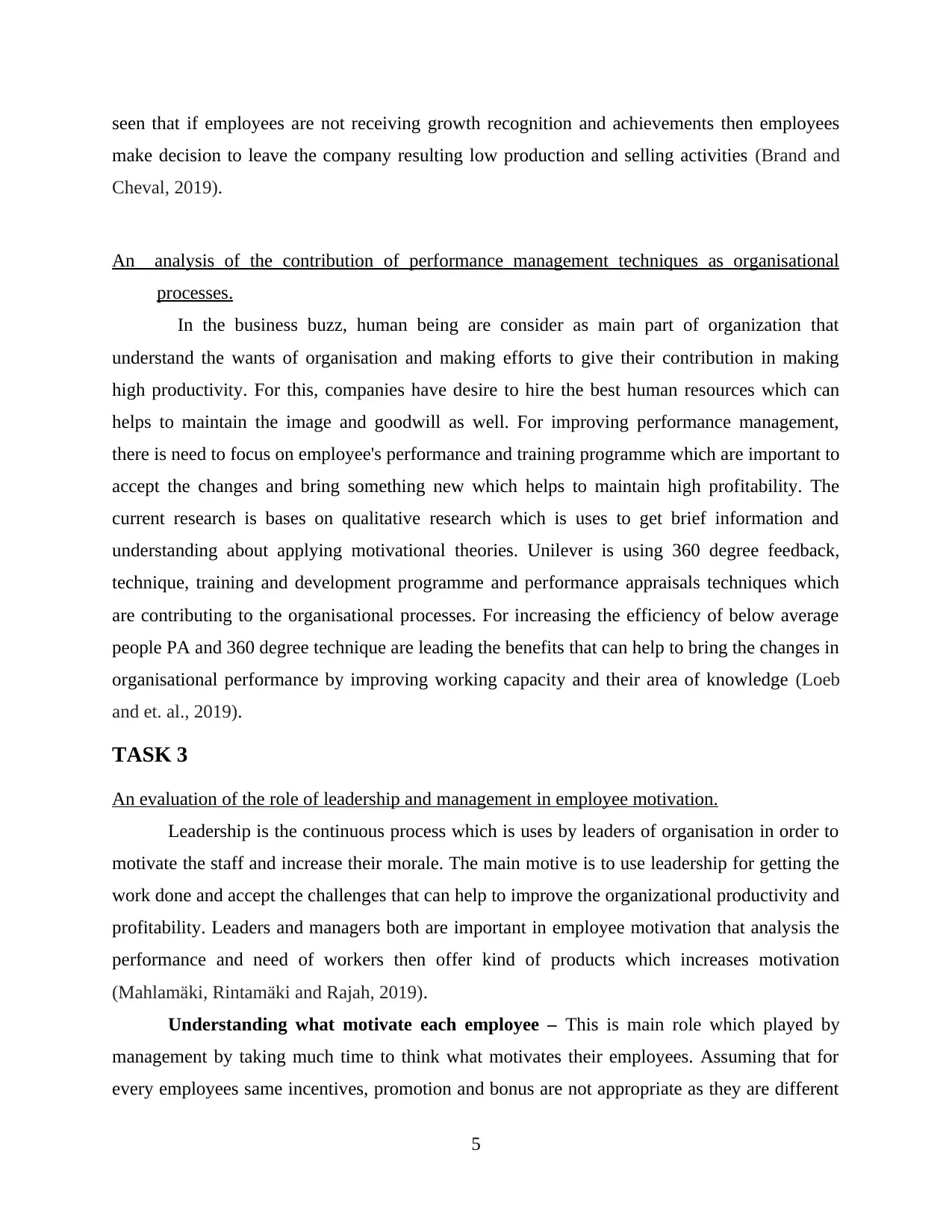
seen that if employees are not receiving growth recognition and achievements then employees
make decision to leave the company resulting low production and selling activities (Brand and
Cheval, 2019).
An analysis of the contribution of performance management techniques as organisational
processes.
In the business buzz, human being are consider as main part of organization that
understand the wants of organisation and making efforts to give their contribution in making
high productivity. For this, companies have desire to hire the best human resources which can
helps to maintain the image and goodwill as well. For improving performance management,
there is need to focus on employee's performance and training programme which are important to
accept the changes and bring something new which helps to maintain high profitability. The
current research is bases on qualitative research which is uses to get brief information and
understanding about applying motivational theories. Unilever is using 360 degree feedback,
technique, training and development programme and performance appraisals techniques which
are contributing to the organisational processes. For increasing the efficiency of below average
people PA and 360 degree technique are leading the benefits that can help to bring the changes in
organisational performance by improving working capacity and their area of knowledge (Loeb
and et. al., 2019).
TASK 3
An evaluation of the role of leadership and management in employee motivation.
Leadership is the continuous process which is uses by leaders of organisation in order to
motivate the staff and increase their morale. The main motive is to use leadership for getting the
work done and accept the challenges that can help to improve the organizational productivity and
profitability. Leaders and managers both are important in employee motivation that analysis the
performance and need of workers then offer kind of products which increases motivation
(Mahlamäki, Rintamäki and Rajah, 2019).
Understanding what motivate each employee – This is main role which played by
management by taking much time to think what motivates their employees. Assuming that for
every employees same incentives, promotion and bonus are not appropriate as they are different
5
make decision to leave the company resulting low production and selling activities (Brand and
Cheval, 2019).
An analysis of the contribution of performance management techniques as organisational
processes.
In the business buzz, human being are consider as main part of organization that
understand the wants of organisation and making efforts to give their contribution in making
high productivity. For this, companies have desire to hire the best human resources which can
helps to maintain the image and goodwill as well. For improving performance management,
there is need to focus on employee's performance and training programme which are important to
accept the changes and bring something new which helps to maintain high profitability. The
current research is bases on qualitative research which is uses to get brief information and
understanding about applying motivational theories. Unilever is using 360 degree feedback,
technique, training and development programme and performance appraisals techniques which
are contributing to the organisational processes. For increasing the efficiency of below average
people PA and 360 degree technique are leading the benefits that can help to bring the changes in
organisational performance by improving working capacity and their area of knowledge (Loeb
and et. al., 2019).
TASK 3
An evaluation of the role of leadership and management in employee motivation.
Leadership is the continuous process which is uses by leaders of organisation in order to
motivate the staff and increase their morale. The main motive is to use leadership for getting the
work done and accept the challenges that can help to improve the organizational productivity and
profitability. Leaders and managers both are important in employee motivation that analysis the
performance and need of workers then offer kind of products which increases motivation
(Mahlamäki, Rintamäki and Rajah, 2019).
Understanding what motivate each employee – This is main role which played by
management by taking much time to think what motivates their employees. Assuming that for
every employees same incentives, promotion and bonus are not appropriate as they are different
5
Paraphrase This Document
Need a fresh take? Get an instant paraphrase of this document with our AI Paraphraser
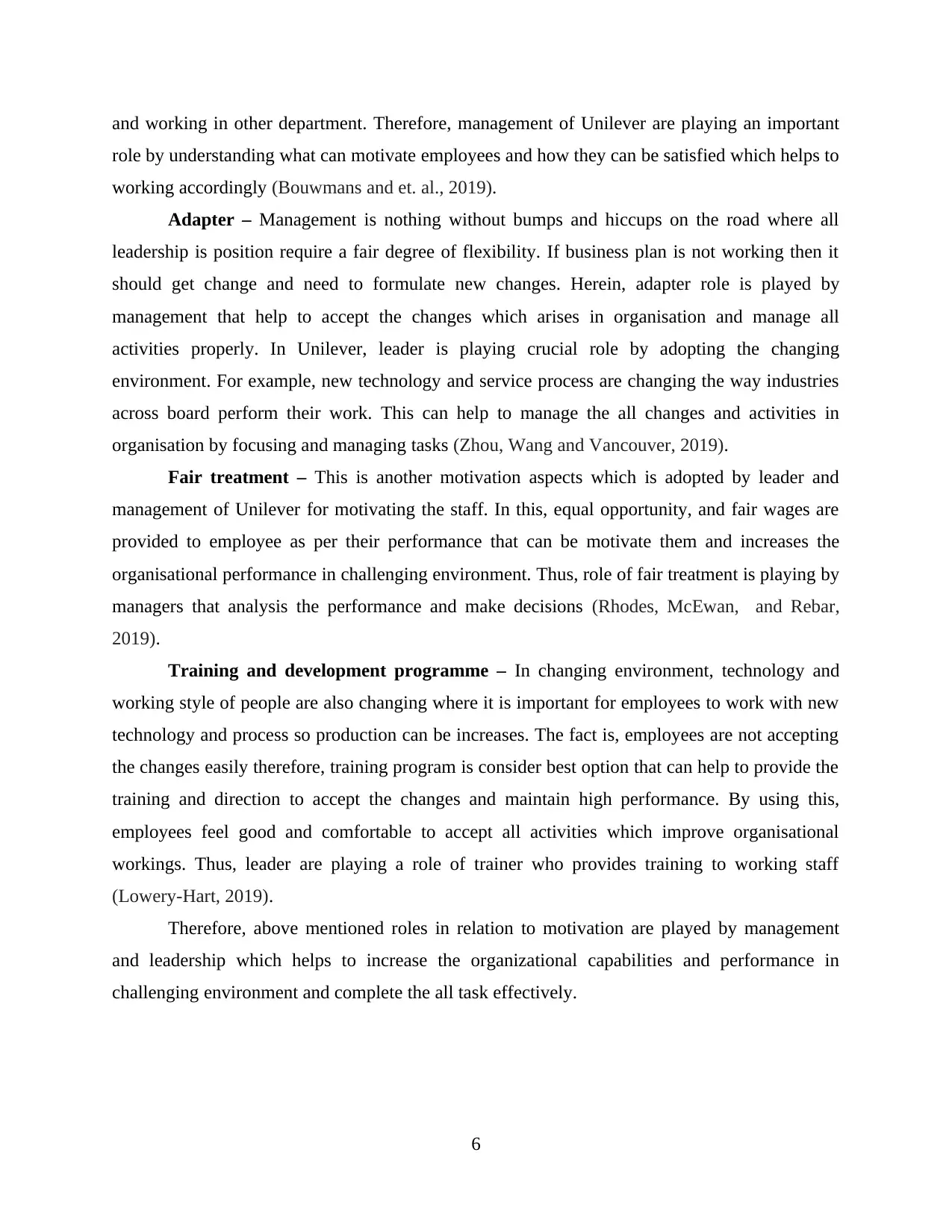
and working in other department. Therefore, management of Unilever are playing an important
role by understanding what can motivate employees and how they can be satisfied which helps to
working accordingly (Bouwmans and et. al., 2019).
Adapter – Management is nothing without bumps and hiccups on the road where all
leadership is position require a fair degree of flexibility. If business plan is not working then it
should get change and need to formulate new changes. Herein, adapter role is played by
management that help to accept the changes which arises in organisation and manage all
activities properly. In Unilever, leader is playing crucial role by adopting the changing
environment. For example, new technology and service process are changing the way industries
across board perform their work. This can help to manage the all changes and activities in
organisation by focusing and managing tasks (Zhou, Wang and Vancouver, 2019).
Fair treatment – This is another motivation aspects which is adopted by leader and
management of Unilever for motivating the staff. In this, equal opportunity, and fair wages are
provided to employee as per their performance that can be motivate them and increases the
organisational performance in challenging environment. Thus, role of fair treatment is playing by
managers that analysis the performance and make decisions (Rhodes, McEwan, and Rebar,
2019).
Training and development programme – In changing environment, technology and
working style of people are also changing where it is important for employees to work with new
technology and process so production can be increases. The fact is, employees are not accepting
the changes easily therefore, training program is consider best option that can help to provide the
training and direction to accept the changes and maintain high performance. By using this,
employees feel good and comfortable to accept all activities which improve organisational
workings. Thus, leader are playing a role of trainer who provides training to working staff
(Lowery-Hart, 2019).
Therefore, above mentioned roles in relation to motivation are played by management
and leadership which helps to increase the organizational capabilities and performance in
challenging environment and complete the all task effectively.
6
role by understanding what can motivate employees and how they can be satisfied which helps to
working accordingly (Bouwmans and et. al., 2019).
Adapter – Management is nothing without bumps and hiccups on the road where all
leadership is position require a fair degree of flexibility. If business plan is not working then it
should get change and need to formulate new changes. Herein, adapter role is played by
management that help to accept the changes which arises in organisation and manage all
activities properly. In Unilever, leader is playing crucial role by adopting the changing
environment. For example, new technology and service process are changing the way industries
across board perform their work. This can help to manage the all changes and activities in
organisation by focusing and managing tasks (Zhou, Wang and Vancouver, 2019).
Fair treatment – This is another motivation aspects which is adopted by leader and
management of Unilever for motivating the staff. In this, equal opportunity, and fair wages are
provided to employee as per their performance that can be motivate them and increases the
organisational performance in challenging environment. Thus, role of fair treatment is playing by
managers that analysis the performance and make decisions (Rhodes, McEwan, and Rebar,
2019).
Training and development programme – In changing environment, technology and
working style of people are also changing where it is important for employees to work with new
technology and process so production can be increases. The fact is, employees are not accepting
the changes easily therefore, training program is consider best option that can help to provide the
training and direction to accept the changes and maintain high performance. By using this,
employees feel good and comfortable to accept all activities which improve organisational
workings. Thus, leader are playing a role of trainer who provides training to working staff
(Lowery-Hart, 2019).
Therefore, above mentioned roles in relation to motivation are played by management
and leadership which helps to increase the organizational capabilities and performance in
challenging environment and complete the all task effectively.
6
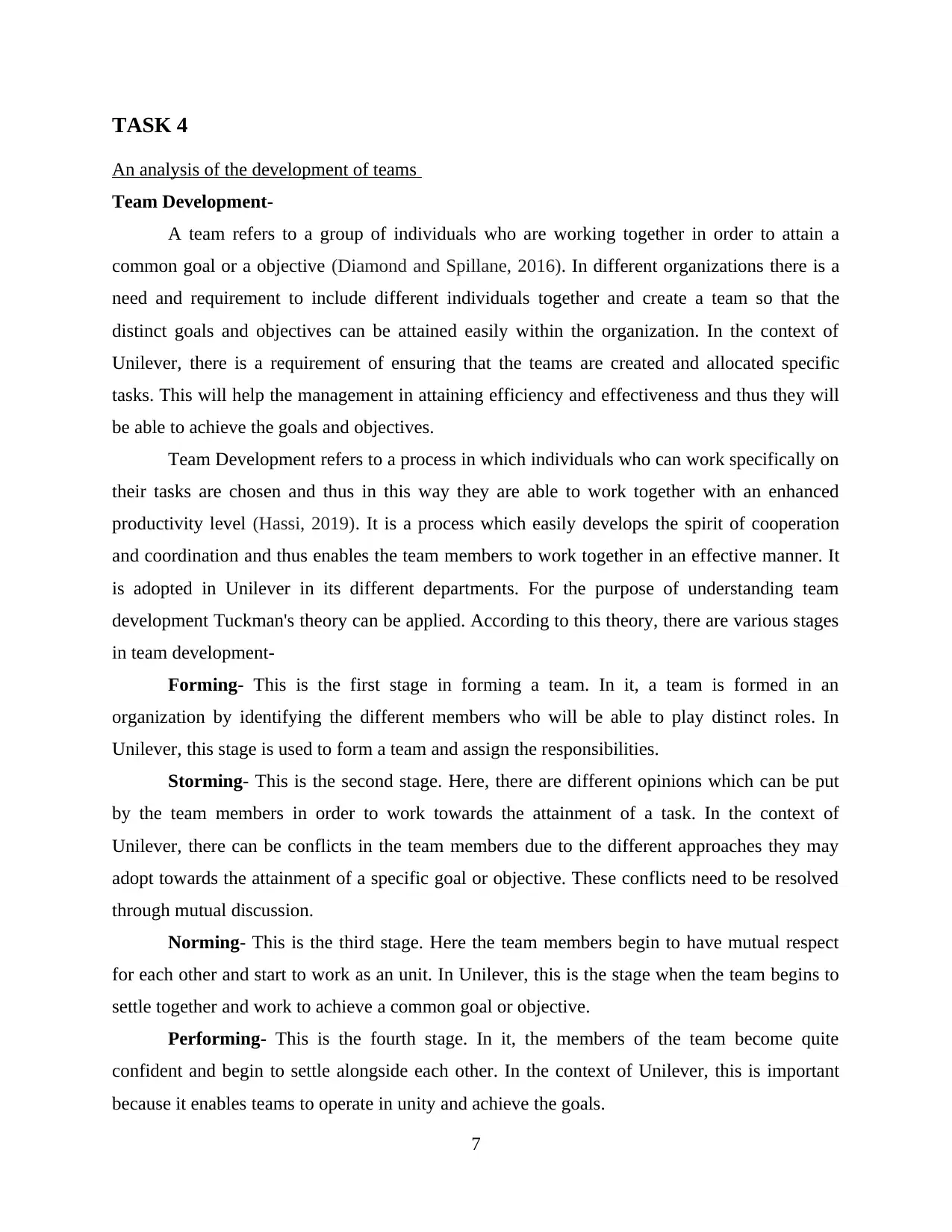
TASK 4
An analysis of the development of teams
Team Development-
A team refers to a group of individuals who are working together in order to attain a
common goal or a objective (Diamond and Spillane, 2016). In different organizations there is a
need and requirement to include different individuals together and create a team so that the
distinct goals and objectives can be attained easily within the organization. In the context of
Unilever, there is a requirement of ensuring that the teams are created and allocated specific
tasks. This will help the management in attaining efficiency and effectiveness and thus they will
be able to achieve the goals and objectives.
Team Development refers to a process in which individuals who can work specifically on
their tasks are chosen and thus in this way they are able to work together with an enhanced
productivity level (Hassi, 2019). It is a process which easily develops the spirit of cooperation
and coordination and thus enables the team members to work together in an effective manner. It
is adopted in Unilever in its different departments. For the purpose of understanding team
development Tuckman's theory can be applied. According to this theory, there are various stages
in team development-
Forming- This is the first stage in forming a team. In it, a team is formed in an
organization by identifying the different members who will be able to play distinct roles. In
Unilever, this stage is used to form a team and assign the responsibilities.
Storming- This is the second stage. Here, there are different opinions which can be put
by the team members in order to work towards the attainment of a task. In the context of
Unilever, there can be conflicts in the team members due to the different approaches they may
adopt towards the attainment of a specific goal or objective. These conflicts need to be resolved
through mutual discussion.
Norming- This is the third stage. Here the team members begin to have mutual respect
for each other and start to work as an unit. In Unilever, this is the stage when the team begins to
settle together and work to achieve a common goal or objective.
Performing- This is the fourth stage. In it, the members of the team become quite
confident and begin to settle alongside each other. In the context of Unilever, this is important
because it enables teams to operate in unity and achieve the goals.
7
An analysis of the development of teams
Team Development-
A team refers to a group of individuals who are working together in order to attain a
common goal or a objective (Diamond and Spillane, 2016). In different organizations there is a
need and requirement to include different individuals together and create a team so that the
distinct goals and objectives can be attained easily within the organization. In the context of
Unilever, there is a requirement of ensuring that the teams are created and allocated specific
tasks. This will help the management in attaining efficiency and effectiveness and thus they will
be able to achieve the goals and objectives.
Team Development refers to a process in which individuals who can work specifically on
their tasks are chosen and thus in this way they are able to work together with an enhanced
productivity level (Hassi, 2019). It is a process which easily develops the spirit of cooperation
and coordination and thus enables the team members to work together in an effective manner. It
is adopted in Unilever in its different departments. For the purpose of understanding team
development Tuckman's theory can be applied. According to this theory, there are various stages
in team development-
Forming- This is the first stage in forming a team. In it, a team is formed in an
organization by identifying the different members who will be able to play distinct roles. In
Unilever, this stage is used to form a team and assign the responsibilities.
Storming- This is the second stage. Here, there are different opinions which can be put
by the team members in order to work towards the attainment of a task. In the context of
Unilever, there can be conflicts in the team members due to the different approaches they may
adopt towards the attainment of a specific goal or objective. These conflicts need to be resolved
through mutual discussion.
Norming- This is the third stage. Here the team members begin to have mutual respect
for each other and start to work as an unit. In Unilever, this is the stage when the team begins to
settle together and work to achieve a common goal or objective.
Performing- This is the fourth stage. In it, the members of the team become quite
confident and begin to settle alongside each other. In the context of Unilever, this is important
because it enables teams to operate in unity and achieve the goals.
7
⊘ This is a preview!⊘
Do you want full access?
Subscribe today to unlock all pages.

Trusted by 1+ million students worldwide
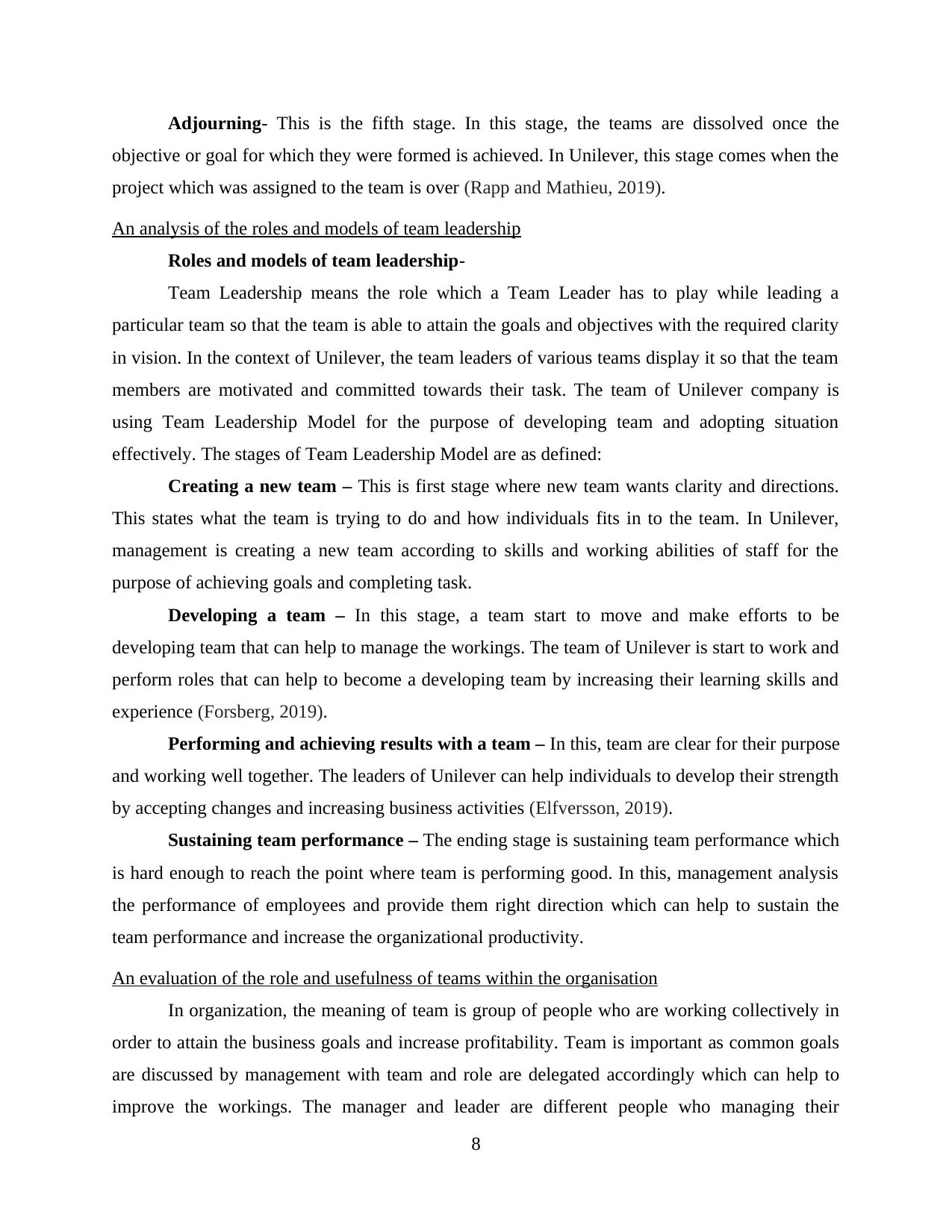
Adjourning- This is the fifth stage. In this stage, the teams are dissolved once the
objective or goal for which they were formed is achieved. In Unilever, this stage comes when the
project which was assigned to the team is over (Rapp and Mathieu, 2019).
An analysis of the roles and models of team leadership
Roles and models of team leadership-
Team Leadership means the role which a Team Leader has to play while leading a
particular team so that the team is able to attain the goals and objectives with the required clarity
in vision. In the context of Unilever, the team leaders of various teams display it so that the team
members are motivated and committed towards their task. The team of Unilever company is
using Team Leadership Model for the purpose of developing team and adopting situation
effectively. The stages of Team Leadership Model are as defined:
Creating a new team – This is first stage where new team wants clarity and directions.
This states what the team is trying to do and how individuals fits in to the team. In Unilever,
management is creating a new team according to skills and working abilities of staff for the
purpose of achieving goals and completing task.
Developing a team – In this stage, a team start to move and make efforts to be
developing team that can help to manage the workings. The team of Unilever is start to work and
perform roles that can help to become a developing team by increasing their learning skills and
experience (Forsberg, 2019).
Performing and achieving results with a team – In this, team are clear for their purpose
and working well together. The leaders of Unilever can help individuals to develop their strength
by accepting changes and increasing business activities (Elfversson, 2019).
Sustaining team performance – The ending stage is sustaining team performance which
is hard enough to reach the point where team is performing good. In this, management analysis
the performance of employees and provide them right direction which can help to sustain the
team performance and increase the organizational productivity.
An evaluation of the role and usefulness of teams within the organisation
In organization, the meaning of team is group of people who are working collectively in
order to attain the business goals and increase profitability. Team is important as common goals
are discussed by management with team and role are delegated accordingly which can help to
improve the workings. The manager and leader are different people who managing their
8
objective or goal for which they were formed is achieved. In Unilever, this stage comes when the
project which was assigned to the team is over (Rapp and Mathieu, 2019).
An analysis of the roles and models of team leadership
Roles and models of team leadership-
Team Leadership means the role which a Team Leader has to play while leading a
particular team so that the team is able to attain the goals and objectives with the required clarity
in vision. In the context of Unilever, the team leaders of various teams display it so that the team
members are motivated and committed towards their task. The team of Unilever company is
using Team Leadership Model for the purpose of developing team and adopting situation
effectively. The stages of Team Leadership Model are as defined:
Creating a new team – This is first stage where new team wants clarity and directions.
This states what the team is trying to do and how individuals fits in to the team. In Unilever,
management is creating a new team according to skills and working abilities of staff for the
purpose of achieving goals and completing task.
Developing a team – In this stage, a team start to move and make efforts to be
developing team that can help to manage the workings. The team of Unilever is start to work and
perform roles that can help to become a developing team by increasing their learning skills and
experience (Forsberg, 2019).
Performing and achieving results with a team – In this, team are clear for their purpose
and working well together. The leaders of Unilever can help individuals to develop their strength
by accepting changes and increasing business activities (Elfversson, 2019).
Sustaining team performance – The ending stage is sustaining team performance which
is hard enough to reach the point where team is performing good. In this, management analysis
the performance of employees and provide them right direction which can help to sustain the
team performance and increase the organizational productivity.
An evaluation of the role and usefulness of teams within the organisation
In organization, the meaning of team is group of people who are working collectively in
order to attain the business goals and increase profitability. Team is important as common goals
are discussed by management with team and role are delegated accordingly which can help to
improve the workings. The manager and leader are different people who managing their
8
Paraphrase This Document
Need a fresh take? Get an instant paraphrase of this document with our AI Paraphraser
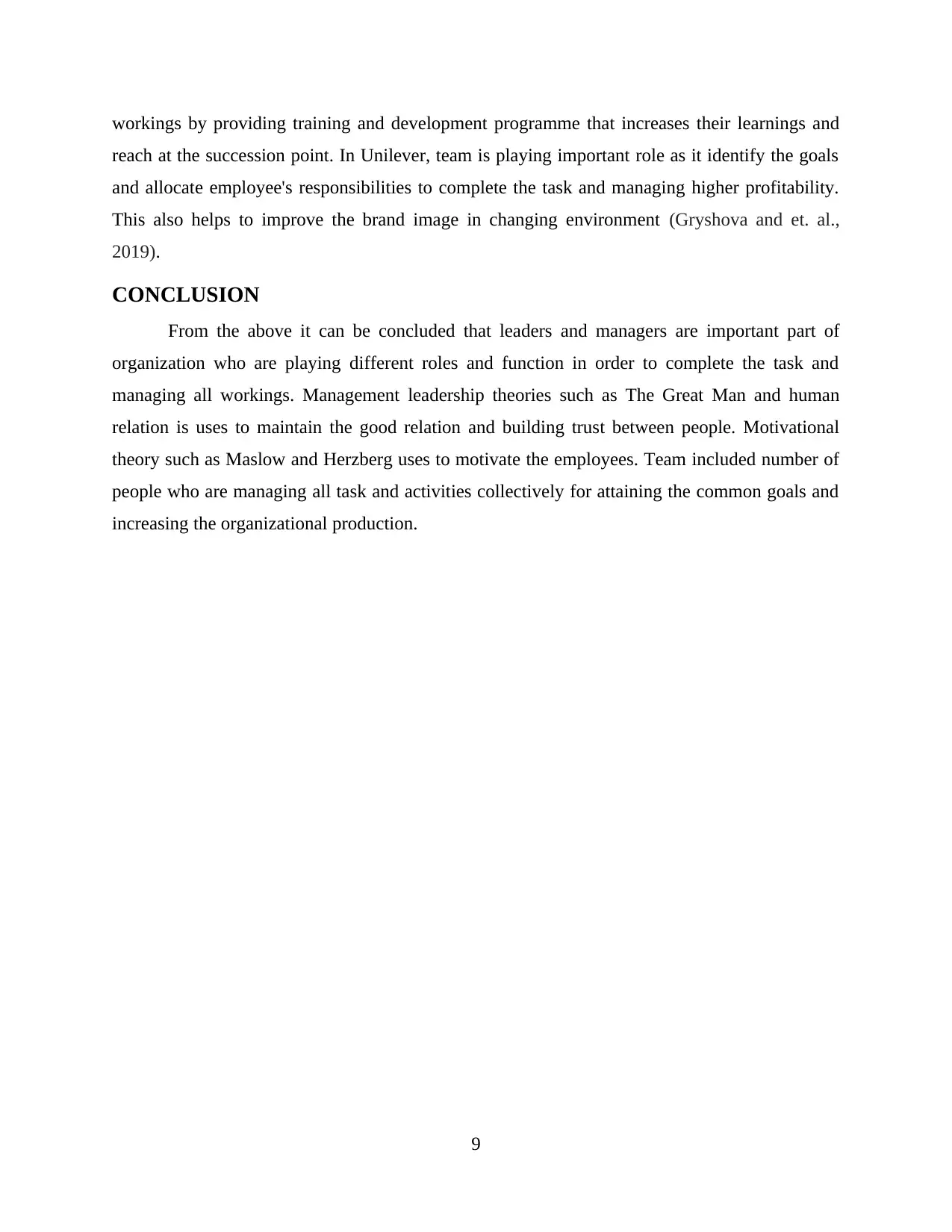
workings by providing training and development programme that increases their learnings and
reach at the succession point. In Unilever, team is playing important role as it identify the goals
and allocate employee's responsibilities to complete the task and managing higher profitability.
This also helps to improve the brand image in changing environment (Gryshova and et. al.,
2019).
CONCLUSION
From the above it can be concluded that leaders and managers are important part of
organization who are playing different roles and function in order to complete the task and
managing all workings. Management leadership theories such as The Great Man and human
relation is uses to maintain the good relation and building trust between people. Motivational
theory such as Maslow and Herzberg uses to motivate the employees. Team included number of
people who are managing all task and activities collectively for attaining the common goals and
increasing the organizational production.
9
reach at the succession point. In Unilever, team is playing important role as it identify the goals
and allocate employee's responsibilities to complete the task and managing higher profitability.
This also helps to improve the brand image in changing environment (Gryshova and et. al.,
2019).
CONCLUSION
From the above it can be concluded that leaders and managers are important part of
organization who are playing different roles and function in order to complete the task and
managing all workings. Management leadership theories such as The Great Man and human
relation is uses to maintain the good relation and building trust between people. Motivational
theory such as Maslow and Herzberg uses to motivate the employees. Team included number of
people who are managing all task and activities collectively for attaining the common goals and
increasing the organizational production.
9
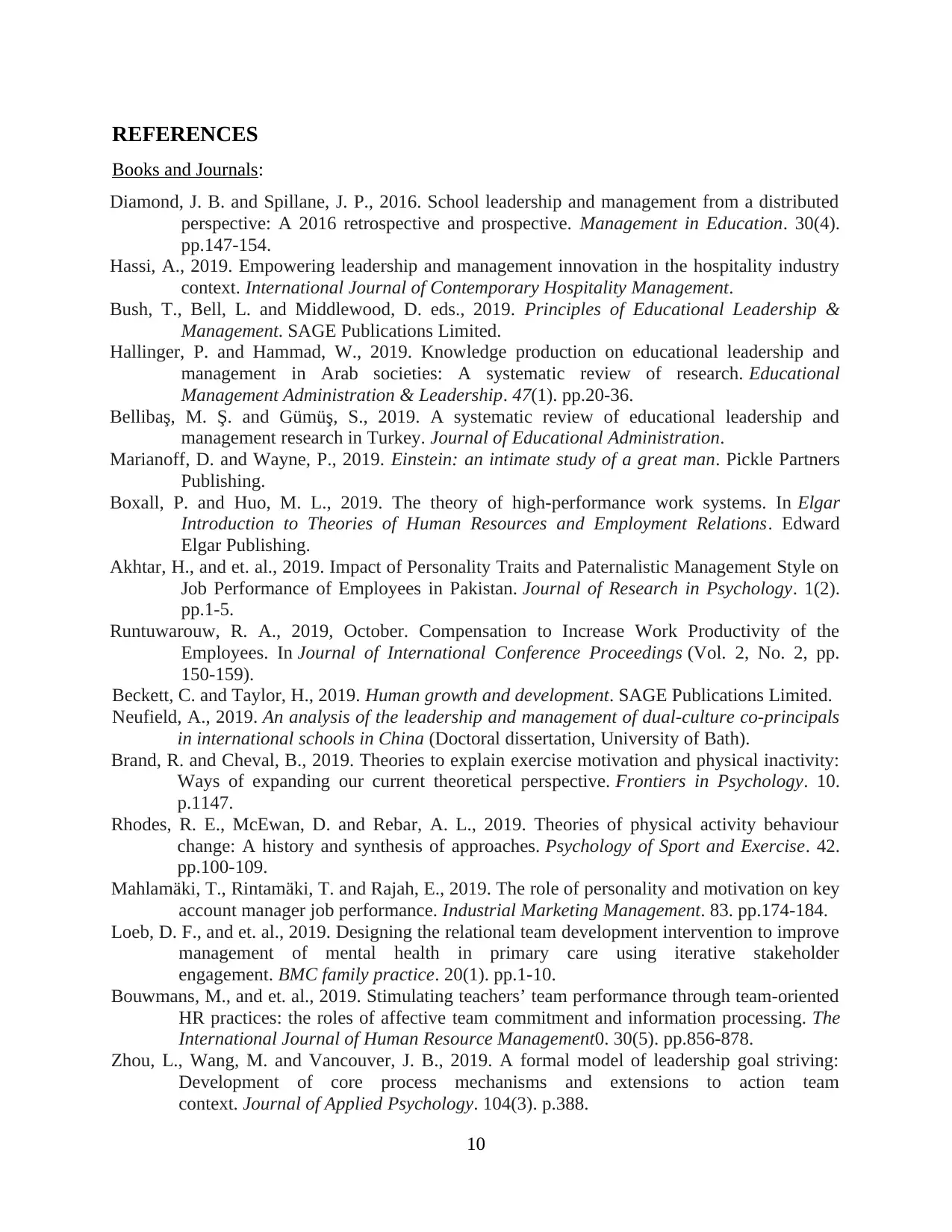
REFERENCES
Books and Journals:
Diamond, J. B. and Spillane, J. P., 2016. School leadership and management from a distributed
perspective: A 2016 retrospective and prospective. Management in Education. 30(4).
pp.147-154.
Hassi, A., 2019. Empowering leadership and management innovation in the hospitality industry
context. International Journal of Contemporary Hospitality Management.
Bush, T., Bell, L. and Middlewood, D. eds., 2019. Principles of Educational Leadership &
Management. SAGE Publications Limited.
Hallinger, P. and Hammad, W., 2019. Knowledge production on educational leadership and
management in Arab societies: A systematic review of research. Educational
Management Administration & Leadership. 47(1). pp.20-36.
Bellibaş, M. Ş. and Gümüş, S., 2019. A systematic review of educational leadership and
management research in Turkey. Journal of Educational Administration.
Marianoff, D. and Wayne, P., 2019. Einstein: an intimate study of a great man. Pickle Partners
Publishing.
Boxall, P. and Huo, M. L., 2019. The theory of high-performance work systems. In Elgar
Introduction to Theories of Human Resources and Employment Relations. Edward
Elgar Publishing.
Akhtar, H., and et. al., 2019. Impact of Personality Traits and Paternalistic Management Style on
Job Performance of Employees in Pakistan. Journal of Research in Psychology. 1(2).
pp.1-5.
Runtuwarouw, R. A., 2019, October. Compensation to Increase Work Productivity of the
Employees. In Journal of International Conference Proceedings (Vol. 2, No. 2, pp.
150-159).
Beckett, C. and Taylor, H., 2019. Human growth and development. SAGE Publications Limited.
Neufield, A., 2019. An analysis of the leadership and management of dual-culture co-principals
in international schools in China (Doctoral dissertation, University of Bath).
Brand, R. and Cheval, B., 2019. Theories to explain exercise motivation and physical inactivity:
Ways of expanding our current theoretical perspective. Frontiers in Psychology. 10.
p.1147.
Rhodes, R. E., McEwan, D. and Rebar, A. L., 2019. Theories of physical activity behaviour
change: A history and synthesis of approaches. Psychology of Sport and Exercise. 42.
pp.100-109.
Mahlamäki, T., Rintamäki, T. and Rajah, E., 2019. The role of personality and motivation on key
account manager job performance. Industrial Marketing Management. 83. pp.174-184.
Loeb, D. F., and et. al., 2019. Designing the relational team development intervention to improve
management of mental health in primary care using iterative stakeholder
engagement. BMC family practice. 20(1). pp.1-10.
Bouwmans, M., and et. al., 2019. Stimulating teachers’ team performance through team-oriented
HR practices: the roles of affective team commitment and information processing. The
International Journal of Human Resource Management0. 30(5). pp.856-878.
Zhou, L., Wang, M. and Vancouver, J. B., 2019. A formal model of leadership goal striving:
Development of core process mechanisms and extensions to action team
context. Journal of Applied Psychology. 104(3). p.388.
10
Books and Journals:
Diamond, J. B. and Spillane, J. P., 2016. School leadership and management from a distributed
perspective: A 2016 retrospective and prospective. Management in Education. 30(4).
pp.147-154.
Hassi, A., 2019. Empowering leadership and management innovation in the hospitality industry
context. International Journal of Contemporary Hospitality Management.
Bush, T., Bell, L. and Middlewood, D. eds., 2019. Principles of Educational Leadership &
Management. SAGE Publications Limited.
Hallinger, P. and Hammad, W., 2019. Knowledge production on educational leadership and
management in Arab societies: A systematic review of research. Educational
Management Administration & Leadership. 47(1). pp.20-36.
Bellibaş, M. Ş. and Gümüş, S., 2019. A systematic review of educational leadership and
management research in Turkey. Journal of Educational Administration.
Marianoff, D. and Wayne, P., 2019. Einstein: an intimate study of a great man. Pickle Partners
Publishing.
Boxall, P. and Huo, M. L., 2019. The theory of high-performance work systems. In Elgar
Introduction to Theories of Human Resources and Employment Relations. Edward
Elgar Publishing.
Akhtar, H., and et. al., 2019. Impact of Personality Traits and Paternalistic Management Style on
Job Performance of Employees in Pakistan. Journal of Research in Psychology. 1(2).
pp.1-5.
Runtuwarouw, R. A., 2019, October. Compensation to Increase Work Productivity of the
Employees. In Journal of International Conference Proceedings (Vol. 2, No. 2, pp.
150-159).
Beckett, C. and Taylor, H., 2019. Human growth and development. SAGE Publications Limited.
Neufield, A., 2019. An analysis of the leadership and management of dual-culture co-principals
in international schools in China (Doctoral dissertation, University of Bath).
Brand, R. and Cheval, B., 2019. Theories to explain exercise motivation and physical inactivity:
Ways of expanding our current theoretical perspective. Frontiers in Psychology. 10.
p.1147.
Rhodes, R. E., McEwan, D. and Rebar, A. L., 2019. Theories of physical activity behaviour
change: A history and synthesis of approaches. Psychology of Sport and Exercise. 42.
pp.100-109.
Mahlamäki, T., Rintamäki, T. and Rajah, E., 2019. The role of personality and motivation on key
account manager job performance. Industrial Marketing Management. 83. pp.174-184.
Loeb, D. F., and et. al., 2019. Designing the relational team development intervention to improve
management of mental health in primary care using iterative stakeholder
engagement. BMC family practice. 20(1). pp.1-10.
Bouwmans, M., and et. al., 2019. Stimulating teachers’ team performance through team-oriented
HR practices: the roles of affective team commitment and information processing. The
International Journal of Human Resource Management0. 30(5). pp.856-878.
Zhou, L., Wang, M. and Vancouver, J. B., 2019. A formal model of leadership goal striving:
Development of core process mechanisms and extensions to action team
context. Journal of Applied Psychology. 104(3). p.388.
10
⊘ This is a preview!⊘
Do you want full access?
Subscribe today to unlock all pages.

Trusted by 1+ million students worldwide
1 out of 13
Related Documents
Your All-in-One AI-Powered Toolkit for Academic Success.
+13062052269
info@desklib.com
Available 24*7 on WhatsApp / Email
![[object Object]](/_next/static/media/star-bottom.7253800d.svg)
Unlock your academic potential
Copyright © 2020–2026 A2Z Services. All Rights Reserved. Developed and managed by ZUCOL.




